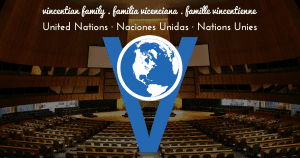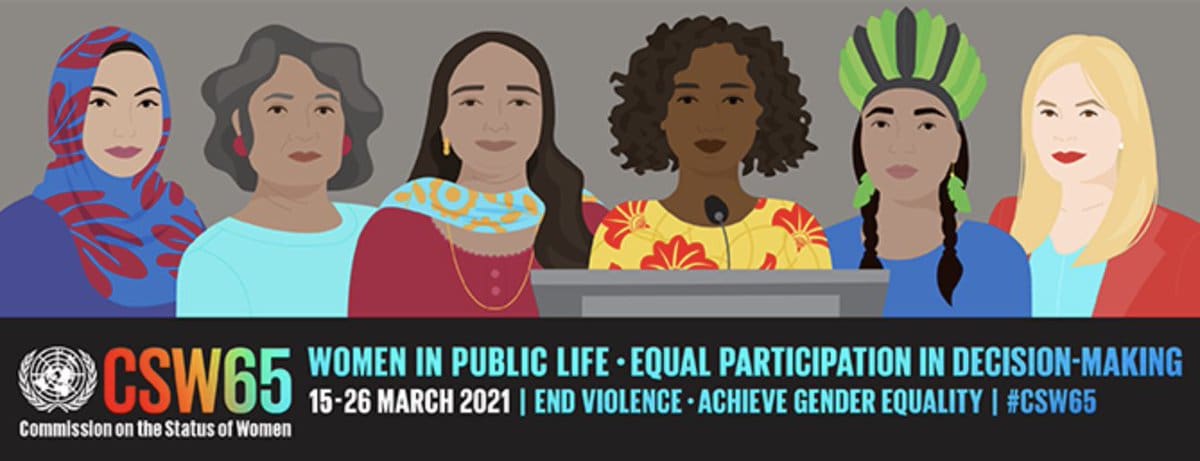The Commission on the Status of Women was established in 1946, to make recommendations on promoting women’s rights in political, economic, civil, social and educational fields. It is a global policy making body dedicated exclusively to promoting gender equality and the empowerment of women. The Commission is responsible for monitoring, reviewing and appraising progress achieved and problems encountered in the implementation of the Beijing Declaration and Platform of Action of 1995 and contributes to the follow up of 2030 Agenda for Sustainable Development, for the realization of gender equality and the empowerment of women and girls.
In a succinct way, the key points of the priority theme are highlighted in the banner above. The question that the global community needs to ask is, do we witness women’s full and effective participation and decision making in public life? To what level have we eliminated violence against women? What is our contribution to achieving gender equality and empowerment of women and girls? Have we “promoted the protection of, and respect for the human rights and fundamental freedoms of all women and girls, including the right to development, which are universal, indivisible, interdependent and interrelated, are crucial for women’s economic empowerment?”
The report of the UN Secretary-General, Antonio Guterres on the priority theme shines a light on the global trends, persistent barriers and opportunities women face in their struggles for effective participation and decision-making in public life. Although women’s participation in public life, both elected and appointed to decision making has increased, they rarely hold leadership positions in executive and legislative offices, because of the persisting structural constraints and barriers that reinforce discriminatory norms, practices and policies. “Men with power often resist women in leadership, even within political parties.” Women serve as Heads of State or Government in only 21 countries. Globally, women hold 21 percent of ministerial positions, and just 14 countries have cabinets with 50% or more positions held by women. The proportion of women in parliaments has doubled since 1995, but men still hold 75% seats. Only three countries have 50% or more women in parliament, and 24 countries have over 40%. Women under 30 years make up less than one percent of parliamentarians globally.
Women in Civil Society: Women do make important contributions in public life through their involvement in women’s organizations, feminist movements and through other civic engagements. This can be seen in the movements led by young women and girls, calling for broader economic, social and environmental justice and systemic transformation. They are disenchanted with party politics and less attached to formal institutions. World over, women’s rights and social justice organizations are calling for collective action for gender equality. In conflict and fragile contexts, it is women’s movements who are taking the lead in aid provision, social cohesion and conflict prevention. Their activism is increasingly visible online – digital platforms have become public spaces to influence policy and politics. The global phenomenon of shrinking civic space is hampering women’s effective participation in civil society by laws that restrict the freedoms of assembly, association and expression in some countries.
The COVID-19 pandemic has compounded the challenges women face. It has rolled back the limited progress made in the past 25 years on gender equality and women empowerment. Though women’s organizations are at the forefront to respond to those most affected by COVID-19, they struggle because of diminishing funding, increased demands for services, restricted movement, online surveillance and shrinking civic space. Underinvestment in women’s organizations is a major challenge that needs to be addressed. Increased access to direct, flexible, and sustainable funding are needed to sustain women’s full participation in public life.
Violence against women in public life: As more women have entered public life, they are subjected to increasing violence and harassment. Women politicians, voters, candidates, and election administrators have faced targeted, gender-based violence. Human rights defenders, journalists, women’s organizations and groups and women of color have been subject to violence. Online, gender-based abuse, cyberbullying, and sexual harassment are increasingly common against women active in public life. States are responsible for preventing, investigating and punishing acts of violence against women in public. Despite the alarming levels violence, fewer than 25% of parliaments have a sexual harassment policy for parliamentarians. States need intensify their efforts to reform legislation, access to justice, and to criminalize violence against women in politics, improve the protection of victims and strengthen the judicial systems. All stakeholders need to step up their efforts to prevent violence and raise awareness.
Social Norms: Discriminatory social norms about gender roles often deny equal access to political participation. The Secretary-General, speaking during the International Women’s Day Celebrations stated: “Too often, services are delivered by women, but decisions are made by men.” Attitudes about women in public have shifted only moderately during the past 25 years. In many countries, social norms and cultural values continue to reinforce the perception that men make better leaders than women. Expressions of aggression, competitiveness, dominance and decisiveness are perceived positively for men but negatively for women. Often laws and policies designed to promote women’s role in public life are hampered by negative social norms and gender stereotypes. Countering social norms requires raising awareness and sensitizing community and religious leaders, the media, men and boys and different generations of women, so that norms can be adjusted.
What role do the media, advertising and film industries play on gender equality and women’s right to participate in public life and decision-making? They have often reinforced gender stereotypes and focused on appearance, personality and family than the merits of their policies and contributions. There is substantial male bias in global news coverage and reversing it requires raising awareness, developing codes of conduct to define and redress gender discrimination. The Violence and Harassment Convention, 2019 (190) of the International Labor Organization (ILO), is expected to establish new standards in the protection of workers’ rights and gender responsive approach for the prevention and elimination of violence and harassment in the world of work. Advocacy is needed to ask States to ratify and enforce the Convention.
To build a better future: Achieving gender equality is a collective responsibility; men and women need to work together to transform institutions and systems. It requires the examination of institutions and their operations, policies, procedures, written and unwritten rules, norms and cultures to reveal and remedy the unseen barriers that prevent women’s participation. When more women are in public life, policymaking will reflect the priorities of families and women. They are capable of working across party lines to address gender violence, promote funding for healthcare, education and socioeconomic issues.
Gender equality cannot be achieved unless public life and decision-making includes women and girls in all their diversity. Transforming the balance of power is essential for promoting and protecting women’s human rights and solving urgent challenges of the current age, from deepening inequalities and polarization, to the climate crisis and the COVID-19 pandemic. It depends on political will, close cooperation between women and men, networking among women in different decision-making positions, gender-responsive institutions and the provision of greater financing for women in public life. To achieve gender equality and the full and effective participation of women in decision-making and public life, the Commission on the Status of Women is urging the Governments to act on the following areas:
- Strengthen normative, legal and regulatory frameworks
- Prevent and eliminate violence against women in public life
- Strengthen gender-responsive institutional reforms
- Increase the availability of high-quality financing in support of women’s participation in public life
- Strengthen women’s voice and leave no one behind in public life
(CSW65 request to governments can be found by clicking here)
Teresa Kotturan SCN
NGO Representative at the UN
Sisters of Charity Federation









0 Comments